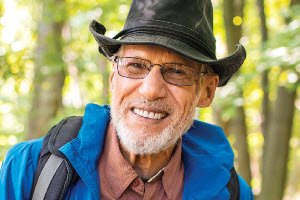
Take a Hike: How An Innovative Heart Procedure Got Norm Levy Back on the Trail
Less than three months after heart surgery, Norm Levy, 79, hiked the Grand Canyon. Seven miles down, with an elevation drop of 5,000 feet. And then back up.
It’s a trip he usually makes once a year, but this year he was a bit slower than normal. It had nothing to do with his heart, though. He got caught in a snowstorm. “I was breathing just fine,” he says.
Two weeks before that – only two months after surgery – he led a group hike across the state of Maryland on the Appalachian Trail. Forty-one miles, averaging 10 miles a day. “That was just so easy,” says Levy.
A bad aortic valve
Levy’s heart problems were diagnosed in November 2018 when he went in for tests because he could “only” walk up five flights of stairs. He usually does 32 flights – twice. He’d been off his feet for three months because of a ruptured ankle tendon and when it healed, he expected to go back to his version of normal exercise, but he was having trouble breathing. His doctor sent him to a specialist, who diagnosed a bad aortic valve and recommended surgery to replace it.
“I never thought I would have a problem with my heart,” Levy says. “But it probably has been creeping up on me and I never noticed it.” He was born with a heart murmur, as was his daughter, so he suspects it is hereditary.
Surgery one day, walking the mall three days later

Dr. Marvin Eng performed the TAVR procedure on Levy on March 7, four months after the problem was diagnosed. The process took only an hour and a half. Levy’s arteries were clear – his only problem was the aortic valve. He left the hospital a day later and was walking the mall the day after that. On April 1, he started cardiac rehab, and by May 5 he was on the Appalachian Trail; on May 19, he started his Grand Canyon trek.
“We normally start right in with exercising,” says Robert Berry, clinical coordinator of cardiac rehabilitation at Henry Ford Hospital, who oversaw Levy’s recovery. “Because Norm is who he is, we started off somewhat aggressively.”
A large part of recovery entails education and lifestyle changes, Berry says, so he develops individualized approaches once he gets to know a patient. “The favorite part of my job is hearing people’s backstory,” he says. He learned that Levy is not your typical older adult, so he incorporated hiking into his recovery. “We brought a backpack in, put weights in it and he hiked in a controlled environment in cardiac rehab,” Berry says. “We’re trying to meet him where he is.”
Levy did cardiac rehab three days a week, which included blood pressure measurement, wearing a heart monitor while exercising and classes on nutrition and the physiology of the heart.
“If patients don’t understand the importance of maintaining regular physical activity, they lose the gains they made in cardiac rehab,” Berry says. “They’re back to where they started.”
There’s no chance of that happening with Levy. He exercises on his own at least 1.5 hours a day and is back to stair climbing, which he started when he was a medical salesman. He’s planning more hiking trips, including a special one for his 80th birthday: a 44-mile trek from the south rim of the Grand Canyon to the north rim and back again, going up and down 5,000–6,000 feet three times in four days.
His wife of 55 years, Phyllis, encourages him, but doesn’t hike. They have three children and four grandchildren and none of them hikes – yet. “I didn’t start until my forties, so there’s still time,” Levy says.
He’s always been into sports, such as softball, pick-up basketball and running, so hiking was a natural extension of a lifelong active lifestyle, which he says offers a natural aerobic solution to heart problems. “I’ve been walking since I was a year old,” Levy says. “There’s no skill needed. It’s my cup of tea.”
Categories: Get Healthy
